|
|
|
Sort Order |
|
|
|
Items / Page
|
|
|
|
|
|
|
| Srl | Item |
| 1 |
ID:
147563
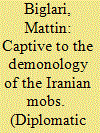

|
|
|
|
|
| Summary/Abstract |
Making use of recently declassified documents, in this article I examine the U.S. government’s perceptions about Shi’a Islam during the time of the Iranian revolution, 1978–9. I show how lower ranking officials in diplomatic and intelligence circles came to the common conception of Shi’ism as being a uniquely populist religion with an inherent propensity towards revolutionary instability, as demonstrated in its doctrines, rituals and history. These perceptions influenced higher levels of government, including President Carter himself. I then explore how analysts and policymakers conceptualized the religious leadership in Iran, especially Khomeini. I show that although opinion was divided about whether Khomeini represented U.S. interests, the prevailing view was to oppose him because of his populist tendencies empowering the Iranian masses, which senior policymakers had come to see as integral to Shi’ism itself. As a result, I argue, although the wider Cold War context dictated the U.S. government’s attempt to maintain diplomatic relations with the new Iranian regime in 1979, this was to be done without overtures to Khomeini, long before the Hostage Crisis.
|
|
|
|
|
|
|
|
|
|
|
|
|
|
|
|
| 2 |
ID:
124191
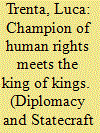

|
|
|
|
|
| Publication |
2013.
|
| Summary/Abstract |
Building on the recent re-discovery of the Iranian Revolution, this analysis examines the policies of the Carter Administration and their effects on Iran and the Iranian opposition. Starting with Jimmy Carter's election and hopes for a new era in American-Iranian relations, there occurred the progressive creation and expansion of a rift between the Carter Administration and the Iranian opposition. This rift was exacerbated by stubborn American support for an increasingly weak Shah, and by the complete unwillingness, both in Washington and at the American Embassy in Tehran, to meet with opposition members, let alone with Ayatollah Ruhollah Khomeini. In this sense, the horizon of the analysis of the origins of the Iran hostage crisis is expanded with a longer-term perspective. The taking of the hostages represented the final act of a troubled relationship that had probably begun before Carter took office.
|
|
|
|
|
|
|
|
|
|
|
|
|
|
|
|
| 3 |
ID:
030620
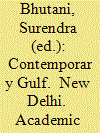

|
|
|
|
|
| Publication |
New Delhi, Academic Press, 1980.
|
| Description |
xii, 148p.hbk
|
|
|
|
|
|
|
|
|
|
|
|
Copies: C:1/I:0,R:0,Q:0
Circulation
| Accession# | Call# | Current Location | Status | Policy | Location |
| 018848 | 953.05/BHU 018848 | Main | On Shelf | General | |
|
|
|
|
| 4 |
ID:
081052
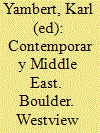

|
|
|
|
|
| Publication |
Boulder, Westview Press, 2006.
|
| Description |
xxviii, 308p.pbk
|
| Standard Number |
9780813343396
|
|
|
|
|
|
|
|
|
|
|
|
Copies: C:1/I:0,R:0,Q:0
Circulation
| Accession# | Call# | Current Location | Status | Policy | Location |
| 053126 | 956.05/YAM 053126 | Main | On Shelf | General | |
|
|
|
|
| 5 |
ID:
186371


|
|
|
|
|
| Summary/Abstract |
Jimmy Carter is often accused of ‘losing Iran’. It may therefore come as a surprise that no American tried harder to forestall the Iranian Revolution than Carter. The increasing availability of archival evidence reveals that Carter tried to press Shah Mohammad Reza Pahlavi, who was reluctant to act, to restore order. Carter even contemplated a military coup to prevent the assumption of power by revolutionary leader Ayatollah Ruhollah Khomeini. None of this worked, because America’s allies were too fickle and its adversaries too determined. Carter was ultimately guilty not of ‘losing’ Iran, but of misunderstanding it.
|
|
|
|
|
|
|
|
|
|
|
|
|
|
|
|
| 6 |
ID:
184875
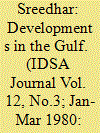

|
|
|
| 7 |
ID:
184866
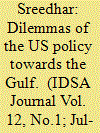

|
|
|
| 8 |
ID:
154649
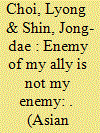

|
|
|
|
|
| Summary/Abstract |
In this article we examine the exceptional case of South Korea's establishment of cooperative relations with Iran, despite the latter's confrontation with the United States, South Korea's closest ally, in the late 1970s and early 1980s. We discuss the conventional idea of the imbalanced relationship—the enemy of my ally is not my enemy—to explain South Korea's approach toward Iran, evaluate its past and current relations, and offer policy suggestions for the future relationship between the two countries. Using newly discovered archival resources and political records from South Korea, we provide a more exact picture of the international relations among South Korea, Iran, and the United States in the early 1980s.
|
|
|
|
|
|
|
|
|
|
|
|
|
|
|
|
| 9 |
ID:
182846
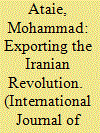

|
|
|
|
|
| Summary/Abstract |
From the dawn of the 1978–79 Iranian Revolution until the consolidation of Hizbullah in the late 1980s, a network of Iranian, Lebanese, and Palestinian clerics played a crucial role in spreading the revolution to Lebanon and laying the groundwork for Hizbullah. Whereas the historiography of the post-1979 Iran–Lebanon relationship is overwhelmingly focused on Hizbullah, the present study, by drawing on oral history interviews with these clerics and archival materials, contends that the Iranian Revolution came to Lebanon primarily through these Shi‘i and Sunni clerics, who joined ranks and established the Association of Muslim ‘Ulama’ in Lebanon in the wake of the 1982 Israeli invasion. This study argues that these clerics modeled their struggle on the ‘ulama’-led and mosque-based example of the 1978–79 revolution, which this paper describes as the Khomeinist script, to transcend sect to seed a revolution in Lebanon and mass mobilize against the invasion. This article concludes that the ecumenical script was highly appealing to non-Shi‘i Islamists, a key factor in the success of exporting the revolution and the rise of Hizbullah in Lebanon.
|
|
|
|
|
|
|
|
|
|
|
|
|
|
|
|
| 10 |
ID:
095106


|
|
|
| 11 |
ID:
184904


|
|
|
| 12 |
ID:
111589
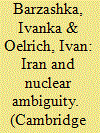

|
|
|
|
|
| Publication |
2012.
|
| Summary/Abstract |
A comparison between Iran's current nuclear efforts and those of the pro-Western regime of Shah Reza Pahlavi shows that Iranian ambitions for a full-fledged civilian nuclear programme have remained relatively constant for nearly half a century. Today, fuel cycle technology provides Iran with a latent nuclear weapon's potential. However, US concerns about an Iranian bomb, which began in the early 1970s and aggravated after the Iranian Revolution, long predate Teheran's uranium enrichment programme. Thus, Iran is a specific case of the general problem presented by the inherent potential of nuclear technology to both civilian and military ends. Approaches to dealing with a long-term, ambiguous, latent nuclear weapon threat, whether Iranian or other, are suggested.
|
|
|
|
|
|
|
|
|
|
|
|
|
|
|
|
| 13 |
ID:
192293
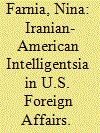

|
|
|
|
|
| Summary/Abstract |
This article challenges the anti-structural and ahistorical turn in recent histories of the Iranian Revolution. Tracing the genealogy of this anti-structural turn to the publication of Foucault’s writings on Iran, the author argues that the continued decline of US-Iran relations, coupled with hostility toward anti-imperialist scholarship in US academia, has created the conditions for an ahistoricism in US-based scholarship on Iran. This turn is further exacerbated by the lack of accessible archives to enable rigorous analyses of the Revolution. The article concludes by distinguishing between an intellectual, one who challenges the status quo to create a more just world, and a functionary, whose scholarly contributions are guided by the precepts of foundation funding and the State Department. Ultimately the article calls for a transformation in Iranian Studies toward radical intellectualism.
|
|
|
|
|
|
|
|
|
|
|
|
|
|
|
|
| 14 |
ID:
046064
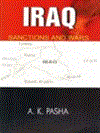

|
|
|
|
|
| Publication |
New Delhi, Sterling Publishers Private Limited, 2003.
|
| Description |
ix, 163p.Hbk
|
| Standard Number |
8120725611
|
|
|
|
|
|
|
|
|
|
|
|
Copies: C:2/I:0,R:0,Q:0
Circulation
| Accession# | Call# | Current Location | Status | Policy | Location |
| 046867 | 956.7/PAS 046867 | Main | On Shelf | General | |
| 057888 | 956.7/PAS 057888 | Main | On Shelf | General | |
|
|
|
|
| 15 |
ID:
081039
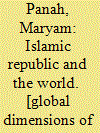

|
|
|
|
|
| Publication |
London, Pluto Press, 2007.
|
| Description |
xi, 212p.hbk
|
| Standard Number |
9780745326221
|
|
|
|
|
|
|
|
|
|
|
|
Copies: C:1/I:0,R:0,Q:0
Circulation
| Accession# | Call# | Current Location | Status | Policy | Location |
| 053141 | 955.054/PAN 053141 | Main | On Shelf | General | |
|
|
|
|
| 16 |
ID:
060209
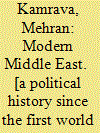

|
|
|
|
|
| Publication |
Berkeley, University of California Press, 2005.
|
| Description |
xiii, 497p.pbk
|
| Standard Number |
0520241509
|
|
|
|
|
|
|
|
|
|
|
|
Copies: C:1/I:0,R:0,Q:0
Circulation
| Accession# | Call# | Current Location | Status | Policy | Location |
| 049433 | 956.04/KAM 049433 | Main | On Shelf | General | |
|
|
|
|
| 17 |
ID:
186908


|
|
|
|
|
| Summary/Abstract |
This paper investigates the activities of the KGB residency in Iran during the 1978–79 revolution and early years of the Islamic Republic. While some foreign experts were quick to point to the KGB as behind the revolution, it soon became clear that Soviet leadership and intelligence were no less surprised with the events than their counterparts in the West. However, this does not mean that Moscow did not see the revolution as an opportunity. The KGB served as one of the principal tools of Soviet attempts to influence the domestic situation in Iran and, although it achieved little in pursuing its goals, KGB activities in Iran reveal the extent to which binary Cold War thinking limited Soviet leadership in dealing with the challenge of the Iranian revolution.
|
|
|
|
|
|
|
|
|
|
|
|
|
|
|
|
| 18 |
ID:
139136
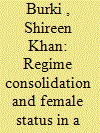

|
|
|
|
|
| Summary/Abstract |
The Iranian Revolution, through Khomeini's consolidation measures, quickly morphed into an ‘Islamic Revolution’. Khomeini's regime abrogated popular legislation such as the Family Protection Laws of 1967 and 1975, which protected the rights of females, as the clerics sought to institute Shariah (Islamic) laws in an ‘Islamic Republic’. The historical record reveals that the precipitous legal transformation from secular to Shariah law under Ayatollah Khomeini's personal tutelage placed females in a dangerous predicament. Regressive gender policies, however, served to mobilize females to push back against the new social paradigm which had emerged under the rubric of Velayat-e-Fiqh. This article examines this misogynistic trajectory during Khomeini's rule and how it served to galvanize many Iranian women to ‘gender activism’.
|
|
|
|
|
|
|
|
|
|
|
|
|
|
|
|
| 19 |
ID:
119435


|
|
|
|
|
| Publication |
2013.
|
| Summary/Abstract |
Religion has seriously affected the gathering of intelligence since Biblical times. Beginning post-World War II with the rise of the state of Israel, however, religion began to become a direct political issue for the first time since the Middle Ages. The 1979 Iranian revolution brought this development to center stage, as practitioners of diplomacy were forced to study the interaction more carefully. The United States Intelligence Community (IC) understood some of this at the tactical level, but like the diplomatic community, has been slow to comprehend how fundamentally religion changes geostrategic considerations, hinders collection, impacts analysis, and changes the nature of covert operations, especially at the strategic level where politics, diplomacy, and intelligence intersect. To meet the challenge, the Intelligence Community and most statesmen need to develop much better understanding of religion's interplay with diplomacy among those at the upper levels who affect the direction of national policy.
|
|
|
|
|
|
|
|
|
|
|
|
|
|
|
|
| 20 |
ID:
178777
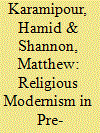

|
|
|
|
|
| Summary/Abstract |
The advent of “modern” education in Iran and its acceptance by political and cultural elites dates to the Qajar era. But the elitist nature of state reforms prevented modern education from spreading throughout society until the Pahlavi era. Especially during the reign of Mohammad Reza Shah Pahlavi, modern education reached most segments of the population, including religious families from the middle classes. This research is based on Persian-language documents and informed by the English-language historiography. The article finds that the Islamic Education Society (Jāmeʿeh-ye taʿlimat-e eslāmi) propagated religious modernism through a national network of private schools beginning in the 1940s. In the 1950s and 1960s private cultural foundations used the Islamic Education Society’s model to establish the Alavi, Kamāl, and Refāh schools in Tehran. The network that supported them was a reflection of the revolutionary movement and a vehicle for its organization by the 1970s.
|
|
|
|
|
|
|
|
|
|
|
|
|
|
|
|
|
|
|
|
|